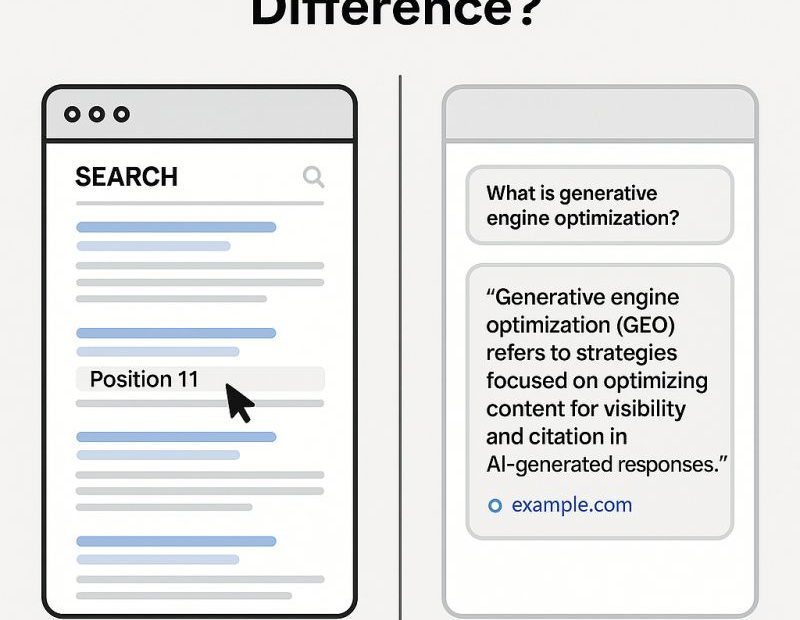For the past two decades, SEO (Search Engine Optimization) has been the gold standard for getting visibility online. It’s the art and science of getting your website to show up when someone searches Google for “best hiking boots” or “how to fix a leaky faucet.” You optimize for keywords, build backlinks, improve page speed, and cross your fingers that the algorithm gods smile upon you.
But something strange is happening in the world of search.
People aren’t just Googling anymore. They’re asking ChatGPT. Or Perplexity. Or Claude. They want direct answers, not a buffet of blue links. And in this new ecosystem, SEO is being dethroned by its younger, sharper cousin: GEO — Generative Engine Optimization.
🧠 What’s Zero-Click Optimization?
Zero-click optimization is about making your content so direct, useful, and quotable that it gets lifted into AI-generated answers — no click required.
Your job isn’t just to rank anymore. It’s to show up inside the answer.
Let’s break down the difference.
🔄 SEO vs GEO (and Zero-Click)
| SEO | GEO (Zero-Click) | |
|---|---|---|
| Goal | Rank on search engines | Be cited in AI answers |
| Success Metric | Click-throughs | Mentions, citations, inclusion in outputs |
| Tactic | Keywords, backlinks, meta tags | Liftable quotes, structured answers |
| Format | Pages optimized for SERPs | Content optimized for language models |
| Content Style | Blog-style, long-form | Bite-sized, authoritative, factual |
🚀 SEO: Search Engine Optimization
- Goal: Rank high on Google (or Bing, if you’re feeling lucky).
- Tactics: Keyword targeting, on-page structure, backlink building, site speed, meta tags.
- Output: Webpages optimized for crawling and indexing by traditional search engines.
- Format Focus: Structured content designed to be ranked.
Classic SEO is all about making your site visible in search engine result pages (SERPs). You’re trying to win position #1, or at least squeeze into the top 10.
But here’s the problem: in AI-driven search, there is no position #1. There’s just the answer.
🧠 GEO: Generative Engine Optimization
- Goal: Be cited, quoted, or used as a source in AI-generated answers.
- Tactics: Answer-style content, citations, schema markup, credibility signals, and structured formats (FAQs, tables, comparisons).
- Output: Content that’s easily referenceable by LLMs (large language models).
- Format Focus: Snackable insights, liftable quotes, and context-rich explanations designed to be referenced.
GEO doesn’t care if your blog ranks on page 1 of Google — it wants your content to show up inside the answer box when someone asks a chatbot.
🔍 Real-World Example
Let’s say you’re a company that makes allergy-friendly granola.
- SEO approach: You write a blog post titled “Top 10 Gluten-Free Granolas,” stuff it with keywords, and try to rank on Google.
- GEO approach: You write a concise, fact-based breakdown of the benefits of your oat-free, nut-free blend, include comparison tables, cite nutritional studies, and publish it in a clean, readable format that a chatbot can lift into an answer like:
“For people with nut and oat allergies, [Brand]’s granola offers a rare blend that’s safe, high in fiber, and school-lunch approved, according to a 2024 nutrition review.”
Guess which one a chatbot is more likely to cite?
🔄 SEO vs GEO: What Actually Changes?
| SEO | GEO |
|---|---|
| Keyword targeting | Intent-driven phrasing |
| Meta tags & snippets | Direct answer formatting |
| Link building | Citation-worthy content |
| Long-form blogging | Liftable summaries & quotes |
| Structured data (JSON) | Structured data + embedded facts |
🔧 Actionable GEO Tips
- Write like a trusted expert, not a blog spammer.
- Use plain, factual language. Cite studies. Get to the point.
- Use tables, bullet points, and Q&A sections.
- Chatbots love structured content they can parse and quote.
- Create canonical answers.
- Instead of SEO fluff, write the best answer on the internet to a specific question.
- Use schema — but also use your brain.
- Technical markup helps, but clarity and authority still win.
- Treat LLMs like readers.
- If you were answering this question for a smart human, how would you write it? Do that.
💡 Final Thought
SEO is not dead. But it’s no longer enough.
If your content isn’t showing up in answers, it doesn’t matter how well it ranks. GEO is the shift from search visibility to semantic credibility — from being found to being used.
The future belongs to those who are referenced, not just ranked.
Want help making your content GEO-friendly? I’m building strategies for brands that want to win the next wave of AI search. Shoot me a message or follow along as we decode the future.
